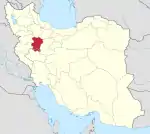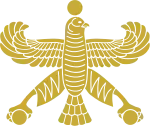Ganjnameh
Ganjnameh (Persian: گنجنامه, romanized: Ganjnāme, lit. 'Treasure Book') is located 12 km southwest of Hamadan (ancient Ecbatana) in western Iran, at an altitude of c. 2000 meters across Mount Alvand.[1][2] The site is home to two trilingual Achaemenid cuneiform inscriptions.[1] The inscription on the upper left was created on the order of Achaemenid King Darius the Great (r. 522–486 BC) and the one on the right by his son King Xerxes the Great (r. 486–465 BC).[1][2][lower-alpha 1]
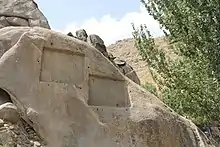 Ganjnameh inscriptions in 2011. | |
| Location | Mount Alvand, Hamadan, Iran |
|---|---|
| Type | Epigraphy |
| Material | Stone |
Description
The two inscription panels of Ganjnameh, carved in stone in 20 lines on a granite rock above a creek, measure 2 × 3 m each.[1][2] Written in Old Persian, Neo-Babylonian and Neo-Elamite, except for the different royal name, the contents of the two inscriptions are identical; Ahura Mazda receives praise, and lineages and conquests are listed.[1][2] According to Stuart C. Brown, in the pre-Hellenistic period, this mountain was apparently the main "east-west pass" through Mount Alvand.[1] During the Achaemenid period, Ecbatana functioned as summer capital due to its high elevation and pleasant weather.[2]
The site received its name from local natives, who believed that the inscriptions contained the secret code to a hidden treasure.[2] Two modern contemporary carved tablets have been placed in the site's parking lot with Persian explanation and its English translation.
Gallery
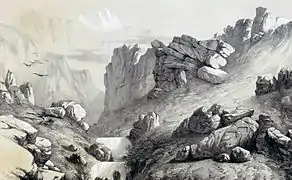 Eugène Flandin's 1840 drawing of Ganjnameh.
Eugène Flandin's 1840 drawing of Ganjnameh._(cropped).jpg.webp) Pascal Coste's 1851 drawing of Ganjnameh.
Pascal Coste's 1851 drawing of Ganjnameh.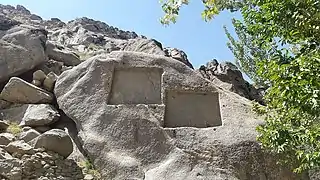 Ganjnameh inscriptions in 2018.
Ganjnameh inscriptions in 2018.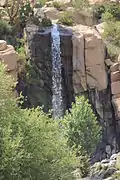 A cascade near Ganjnameh.
A cascade near Ganjnameh.
Notes
- The inscription of Darius is also known as the DE inscription, and the one created by Xerxes as the XE inscription.[3]
References
- Brown 2000, pp. 285-286.
- Kia 2016, p. 19.
- Bachenheimer 2018, pp. 19, 23.
Sources
- Bachenheimer, Avi (2018). Old Persian: Dictionary, Glossary and Concordance. John Wiley & Sons.
- Brown, Stuart C. (2000). "Ganj-nāma". Encyclopaedia Iranica, Vol. X, Fasc. 3. pp. 285–286.
- Kia, Mehrdad (2016). The Persian Empire: A Historical Encyclopedia [2 volumes]. ABC-CLIO. ISBN 978-1610693912.
| Wikimedia Commons has media related to Ganj Nameh inscriptions. |
